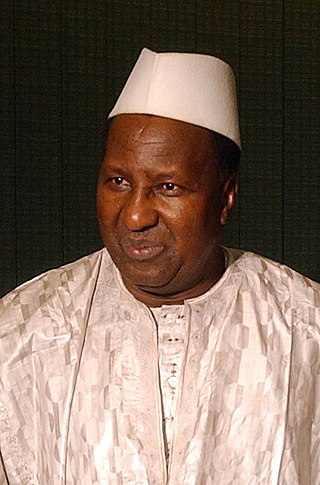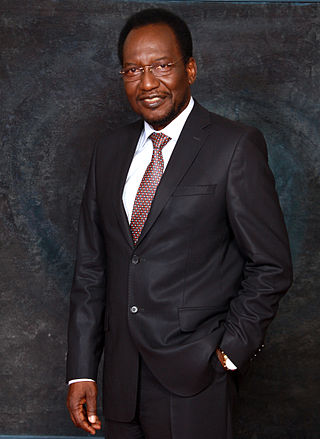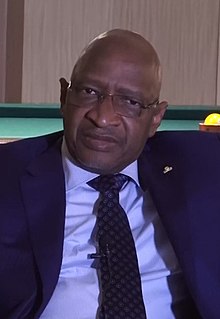French pronunciation: [sumelububɛjmaiga] ; 8 June 1954 – 21 March 2022) was a Malian politician who was the Prime Minister of Mali between 30 December 2017 and 18 April 2019. [1] The leader of the Alliance for Solidarity in Mali, he had previously served in the government of Mali as Minister of Foreign Affairs under President Amadou Toumani Touré from 5 April 2011 [2] until the March 2012 coup d'état. Later he was Minister of Defense from 2013 to 2014 and was Secretary-General of the Presidency from 2016 to 2017.
Contents
Early life and career
Soumeylou Boubèye Maïga was born in Gao on 8 June 1954. [3] He studied journalism from Cheikh Anta Diop University's Center for the Study of Information Science and Technology. [3] In 1987, he graduated from the Paris-Sud University with a Diploma of Specialized Higher Studies (DESS) in diplomacy and international organisation management. [3] Soumeylou also held a master's degree in international economic relations from Paris's Institut d'administration. [3] He began his career as a journalist at L'Essor and then worked at the Malian Press and Advertising Agency's magazine Sunjata. [3]
Political career

As first vice-president of ADEMA-PASJ, Maïga opposed the party's decision to support President Amadou Toumani Touré's bid for re-election in the April 2007 presidential election, and he was consequently expelled from the party. [4]
Along with several other ministers, he was arrested during the coup when rebel soldiers stormed the presidential palace on 22 March 2012. [5] On 25 March, he began a hunger strike along with 13 other arrested officials to protest his detention. [6]
After Ibrahim Boubacar Keïta won the 2013 presidential election, Maïga was appointed to the government as Minister of Defense on 8 September 2013. [7] He was replaced by Bah Ndaw following the army's defeat at the hands of Tuareg rebels in Kidal in May 2014. Although some blamed him for the defeat, others believed he was being used as a scapegoat. [8]
On 29 August 2016, he was appointed Secretary-General of the Presidency with the rank of minister. [9]
Maïga was named Prime Minister on 30 December 2017. [10] [1] He resigned on 18 April 2019 amid public protests following the Ogossagou massacre. [1] [11]
Personal life and death
Maiga died in detention in Bamako on 21 March 2022 at the age of 67. [12]
Related Research Articles

Amadou Toumani Touré was a Malian politician. He supervised Mali's first multiparty elections as chairman of the transitional government (1991–1992), and later became the second democratically elected President of Mali (2002–2012).
Ahmed Mohamed ag Hamani was the prime minister of Mali from 2002 to 2004.
Ousmane Issoufi Maïga was the Prime Minister of Mali from 2004 to 2007. Issoufi had previously held several ministerial posts in previous governments.

Alpha Oumar Konaré is a Malian politician, professor, historian and archaeologist, who served as President of Mali for two five-year terms from 1992 to 2002 and was Chairperson of the African Union Commission from 2003 to 2008.

Moussa Traoré was a Malian soldier, politician, and dictator who was President of Mali from 1968 to 1991. As a lieutenant, he led the military ousting of President Modibo Keïta in 1968. Thereafter he served as head of state until March 1991, when he was overthrown by popular protests and a military coup.

Ibrahim Boubacar Keïta, often known by his initials IBK, was a Malian politician who served as the president of Mali from September 2013 to August 2020, when he was forced to resign in the 2020 Malian coup d'état. He served as Mali's prime minister from February 1994 to February 2000 and as president of the National Assembly of Mali from September 2002 to September 2007.

The Alliance for Democracy in Mali – African Party for Solidarity and Justice is a political party in Mali.

Presidential elections were held in Mali on 29 April 2007. Incumbent president Amadou Toumani Touré ran for re-election against seven other candidates and won in the first round with about 71% of the vote.
The Front for Democracy and the Republic is an opposition coalition in Mali that fought the presidential election on 29 April 2007 and the parliamentary election of 1 July and 22 July 2007. The FDR is an umbrella organisation, bringing together 16 independent political parties and groups. It rejected the official results of the election, according to which incumbent president Amadou Toumani Touré won with about 71% of the vote, and alleged fraud, unsuccessfully asking the Constitutional Court to annul the election. On 19 May, the leading FDR candidate, National Assembly president Ibrahim Boubacar Kéita, said that the group would abide by the court's decision to confirm Touré's victory and would concentrate on the July 2007 parliamentary election.

Dioncounda Traoré is a Malian politician who was President of Mali in an interim capacity from April 2012 to September 2013. Previously he was President of the National Assembly of Mali from 2007 to 2012, and he served as Minister of Foreign Affairs from 1994 to 1997. He was President of the Alliance for Democracy in Mali-African Party for Solidarity and Justice (ADEMA-PASJ) beginning in 2000, and he was also President of the Alliance for Democracy and Progress (ADP), an alliance of parties that supported the re-election of President Amadou Toumani Touré in 2007.

Modibo Sidibé is a Malian politician who was Prime Minister of Mali from September 2007 to April 2011.

Choguel Kokalla Maïga is a Malian politician and President of the Patriotic Movement for Renewal, a political party in Mali, and current Prime Minister of the Transition. He served in the government as Minister of Industry and Trade from 2002 to 2007 and later as Minister of the Digital Economy, Information and Communication from 2015 to 2016. On 4 June 2021, he was named Prime Minister of the Transition by coup leader & newly appointed President of Transition Assimi Goïta.
The Malian Party of Labour is a Marxist-Leninist party in Mali and a member of the coalition supporting the Alliance for Democracy in Mali of president Amadou Toumani Touré. Founded in 1965, it was prominent in the student resistance to the 1968-1991 military regime of General Moussa Traoré. It continues as an extra-parliamentary Hoxhaist-Communist faction within the Social-Democratic ADEMA-PASJ coalition, supporters of the Alliance for Democracy and Progress.
Cissé Mariam Kaïdama Sidibé was a Malian politician and the Prime Minister of Mali at the time of the 2012 Malian coup d'état. She was the first female prime minister in the country's history. She was announced to the position by decree on 3 April 2011, replacing Modibo Sidibé. She held the position for slightly less than a year under the presidency of Amadou Toumani Touré before she was removed from office in the 22 March 2012 coup.

The 2012 Malian coup d'état began on 21 March that year, when mutinying Malian soldiers, displeased with the management of the Tuareg rebellion, attacked several locations in the capital Bamako, including the presidential palace, state television, and military barracks. The soldiers, who said they had formed the National Committee for the Restoration of Democracy and State, declared the following day that they had overthrown the government of Amadou Toumani Touré, forcing him into hiding. The coup was followed by "unanimous" international condemnation, harsh sanctions by Mali's neighbors, and the swift loss of northern Mali to Tuareg forces, leading Reuters to describe the coup as "a spectacular own-goal". On 6 April, the junta agreed with Economic Community of West African States (ECOWAS) negotiators that they would step down from power in return for the end of sanctions, giving power to a transitional government led by parliament speaker Dioncounda Traoré. In the following days, both Touré and coup leader Amadou Sanogo formally resigned; however, as of 16 May, the junta was still "widely thought to have maintained overall control". On 3 December 2013, a mass grave was discovered in Diago holding the remains of 21 soldiers that went missing the year before, loyal to the ousted president.
Mohamed Aly Bathily is a Malian politician. He serves as the Malian Minister of State Properties, Land Affairs and Assets.

Amadou Koufa, nom de guerre of Amadou Diallo, also spelled Hamadoun Kouffa or Amadou Kouffa is a Malian Fulani jihadist and preacher who founded Katiba Macina, later part of Jama'at Nasr al-Islam wal Muslimin.

On March 23, 2019, several attacks by gunmen killed a reported 160 Fulani herders in central Mali. The violence came in the aftermath of the Malian government cracking down on Islamic terror cells in the country. Two villages, Ogossagou and Welingara, were particularly affected.
Events in the year 2022 in Mali.
Abidine Guindo is a Malian colonel and the former commander of the 33rd Parachute Commando Regiment. He participated in and led the failed counter-coup attempt against Amadou Haya Sanogo in April 2012.
References
- 1 2 3 "Mali Prime Minister Soumeylou-Boubeye Maiga resigns". Ecofinagency.com. 19 April 2019.
- ↑ Adam Thiam (18 April 2012). "Mali : Boubèye Maïga, les raisons d'un retour". Jeune Afrique (in French). Retrieved 2 July 2012.
- 1 2 3 4 5 "Soumeylou Boubèye Maïga, nommé Premier ministre du Mali". Anadolu Agency . Retrieved 22 November 2021.
- ↑ "Jeuneafrique.com : Soumeylou Boubèye Maiga exclu de l'ADEMA". 30 September 2007. Archived from the original on 30 September 2007. Retrieved 22 November 2021.
- ↑ "Mali president 'safe' after fleeing from overnight rebel coup". Al Arabiya. 22 March 2012. Retrieved 22 March 2012.
- ↑ "Mali officials stage hunger strike to protest coup". Canadian Broadcasting Corporation. Associated Press. 25 March 2012. Retrieved 25 March 2012.
- ↑ "Gouvernement malien : Boubèye Maïga à la Défense, création d'un ministère chargé du Nord – Jeune Afrique". JeuneAfrique.com (in French). Retrieved 22 November 2021.
- ↑ "Ripples from Kidal". africa-confidential.com. Retrieved 22 November 2021.
- ↑ Sinaly M. Daou, "Mali : Soumeylou Boubèye Maïga nommé Secrétaire General de la Présidence avec rang de ministre : L’ancien Directeur de la DGSE revient avec force", L'Observatoire, 3 September 2016 (in French).
- ↑ "Mali: l'ex-ministre de la Défense Soumeylou Boubèye Maiga nommé Premier ministre". Jeune Afrique. 30 December 2017.
- ↑ "Mali's PM Maiga, government resign over Ogossagou massacre". Al Jazeera. 19 April 2019. Retrieved 9 June 2019.
- ↑ "Mali : l'ancien Premier ministre Soumeylou Boubèye Maïga est mort". Jeune Afrique (in French). Retrieved 21 March 2022.
External links
Soumeylou Boubèye Maïga | |
|---|---|
 Maïga in 2019 | |
| Prime Minister of Mali | |
| In office 30 December 2017 –18 April 2019 |